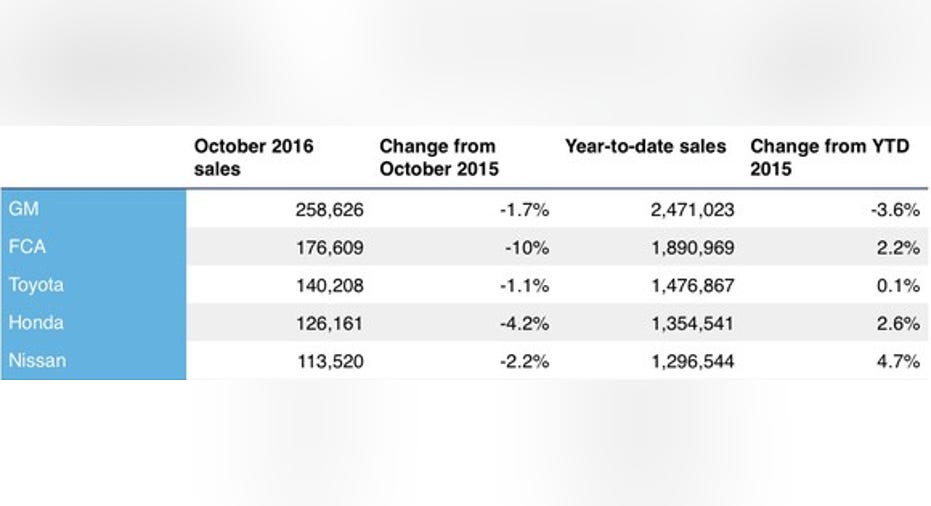Auto Sales Roundup: General Motors and Toyota Lead in a Difficult Month

U.S. sales of Toyota's Highlander SUV jumped almost 33% in October, helping the company best most of its rivals in a tough sales month. Image source: Toyota.
General Motors (NYSE: GM), Fiat Chrysler Automobiles (NYSE: FCAU), Toyota (NYSE: TM), Honda (NYSE: HMC), and Nissan all posted drops in U.S. sales in October, as slumping demand for sedan models and a quirk of the calendar made year-over-year sales growth hard to find.
Analysts expect the overall industry's sales in the U.S. to decline in October, the third monthly drop in a row, adding evidence to the idea that the U.S. new-vehicle market may have passed its cyclical peak.
The key numbers
Data sources: The automakers' sales reports.
About that quirk of the calendar: Last month had two fewer "selling days" than did Oct. 2015, making for a tough year-over-year comparison. "Selling days" exclude Sundays and other days when new-car dealers are typically closed.
A good month at retail for GM
GM's overall sales dropped 1.7%, but that was more than explained by a planned drop in sales to rental-car fleets. Under CEO Mary Barra, GM has made a point of emphasizing more profitable retail sales, while cutting back less profitable sales to rental-car companies. While overall sales were down, GM's U.S. retail sales rose 3% in October, paced by strong gains for SUVs and some car models at both the Chevrolet and Buick brands.
Slipping Jeep sales a concern at FCA
Fiat Chrysler's Ram truck brand posted a 12% sales increasein October, a month after FCA dramatically boosted its incentives on its full-size Ram pickups. But FCA's Jeep brand, its biggest global driver of profits, saw sales slip for the second month in a row. Sales of the midsize Jeep Cherokee, the brand's biggest seller a year ago, were down 23%. But FCA was most hurt by the sales performance of its sedan models: Overall truck and SUV sales were up 12%, but car sales dropped 33%.
Gains for Toyota's SUVs can't quite offset declines for its sedans
Toyota, long dependent on its mainstay Corolla and Camry sedans, has struggled a bit to adapt to a strong shift in buyer preferences toward SUVs. U.S. sales of Toyota-brand cars as a group were down 17% last month, while Toyota-brand SUV sales rose 2%, not enough to make up the difference. Supply may be an issue, as Toyota is expected to boost production of its hot-selling compact RAV4 crossover in the future. One highlight: Sales of the Highlander SUV jumped almost 33%. Sales at Toyota's luxury brand, Lexus, were down 6.2%, with a 19.7% drop for cars partially offset by a 6.1% gain for its SUV models.
Honda's smallest SUV helped offset sedan declines
As with Toyota, gains for Honda's popular SUVs weren't quite enough to offset declines in its sedan sales. Honda-brand truck models, including the HR-V, CR-V, and Pilot SUVs, the Ridgeline pickup, and the Odyssey minivan, were up 1.1% as a group with the small HR-V up 46.5%, but sales of Honda's cars fell 4.9% on a 15% drop in Accord sales. Sales at the premium Acura brand were down 20% on steep declines in sales of the ILX and TLX sedans. A bright spot: Sales of Acura's MDX SUV rose 14.7%.
A good month for Nissan, but at what cost?
Nissan did somewhat better than its Japanese rivals when it came to offsetting industrywide car declines with SUV sales. While sales of Nissan-brand cars dropped 14.5%, sales of its trucks (including SUVs) were up 12.7%, helped by a big jump in sales for its Titan pickup. The concern: Nissan uses an unusually aggressive dealer-incentive program that pays big end-of-month bonuses to dealers that hit sales targets, meaning that Nissan's sales may be coming to some extent at the expense of profits. TrueCar estimates that Nissan's incentive payouts rose to $4,109 per vehicle last month, up over 15% from a year ago.
Sales at Nissan's premium Infiniti brand were up 0.6%.
Where are Ford's results?
A fire at an electrical substation interrupted power to Ford Motor Company's (NYSE: F) world headquarters in Dearborn, Michigan, for several hours on Monday. Ford said that while battery backups protected its data, parts of its data center were shut down as a precaution. That prevented Ford dealers from reporting sales for the last day of October, and that in turn meant that the Blue Oval didn't have its numbers ready to go on Tuesday morning.The company said that it will report its full U.S. sales results later this week.
A secret billion-dollar stock opportunity The world's biggest tech company forgot to show you something, but a few Wall Street analysts and the Fool didn't miss a beat: There's a small company that's powering their brand-new gadgets and the coming revolution in technology. And we think its stock price has nearly unlimited room to run for early in-the-know investors! To be one of them, just click here.
John Rosevear owns shares of Ford and General Motors. The Motley Fool owns shares of and recommends Ford. The Motley Fool recommends General Motors and TrueCar. Try any of our Foolish newsletter services free for 30 days. We Fools may not all hold the same opinions, but we all believe that considering a diverse range of insights makes us better investors. The Motley Fool has a disclosure policy.



















